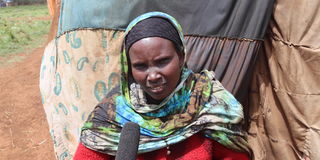Group helps Gabbra single mothers cast out by their families

Thune Wario at her Hurri Hills home in Marsabit County on May 26, 2022. She decried the challenges faced by single mothers and their children.
Bearing a child outside wedlock and teen pregnancies have sparked hotly contested debates in Kenya recently.
But among the Gabbra community in Marsabit County, it is a subject that is immediately muted as it is considered taboo.
Anything related to sexual intercourse outside a properly instituted marriage is still taboo, said Indigenous Rights and Resource Management Organisation (Iremo) CEO Darare Salesa.
“Gabbra community customs forbid sexual relationships outside marriage and the children born out of wedlock are mistreated in a way that to me is unfair and discriminatory,” Ms Salesa says.
According to the Gabbra, marriage is the only legal way to sexual interactions and childbearing, and anything outside such a set-up is illicit.
The purity of a girl has over the years been held in high esteem to the extent that during traditional marriage ceremonies, a bride was subjected to a purity test during the first sexual intercourse with the groom, just to establish that she was still a virgin.
A bride who passed such a test would be wildly celebrated with songs, ovations and shouts of acclamation.
On the flip side, any bride who failed the test would be rejected and considered a source of shame to her family. That is why childbearing out of wedlock has been minimal among the Gabbra.
Their tradition of moral rejection has over the years affected young girls aged between 14 and 17 who give birth out of wedlock and children born outside legal marriage.
Most such girls spend their teenagehood taking care of livestock.
This kind of stereotype that frames women only as the embodiment of good morals has been considered a serious form of gender discrimination and marginalisation as it is only women who get punished.
Morally pure
Young men who impregnate such women are cleansed, integrated with the community and get to marry totally different women that society considers morally pure.

Darare Salesa, the CEO of Indigenous Rights and Resource Management Organisation. She says that several single mothers suffer due to discrimination.
Even debate on the paternity of an unborn child was out of order as such children were ridiculed and declared bastards who should no longer identify with the Gabbra community.
The subsequent offspring of such children were also never allowed to marry or get married by the Gabbra community members.
Until 2006, any Gabbra girl who became pregnant out of wedlock was chased unceremoniously to neighbouring communities such as the Rendille or the Turkana.
But Iremo is fighting against the violation of the rights of such girls.
Today, most single women are found in various trading centres in North Horr sub-county.
According to data compiled by Iremo, there are 46 such single mothers in Maikona, 40 in Kalacha, 76 in Dukana and 100 in North Horr trading centres.
The true number is way bigger than this, as the organisation only documented the number of women who agreed to join socio-economic empowerment groups.
Traditional elders
Ms Salesa is happy that talks they have held with the community’s traditional elders are yielding fruit as they have begun relaxing rules against such girls by allowing them to stay at the trading centres.
Sororo Dimba Dambala, 55, is a mother of five. After giving birth to her first child, she was sent packing to Kalacha, where she has adapted to new ways of living.
Similar experiences were recounted by Arbe Katelo, 56, a mother of six.
The women were not allowed to reunite with their families, having been declared outcasts.
There were days they had to venture into the illicit brew business, and this always got them in conflict with law enforcers.
Thune Wario, a mother of three, and Tume Abudho, a mother of four, from Hurri Hills trading centre, were also full of accounts of agonising experiences they went through because they became single mothers.
But they found hope in the Iremo socio-economic, livelihood and resilience programmes that gave their groups Sh100,000 each to help them venture into businesses.
Ms Dimba told the Nation that because they had been sidelined by everyone, their children were the only hope they had in life.
That is why they gave a lot of value to their children’s education in the hope that if they succeed in life, they would change how the community views single mothers.
Also read: Nine students arrested over arson attempt
They appealed to the government and other stakeholders to help them with more funds so that they can expand their businesses or venture into the lucrative livestock trade in the region.
Come to terms
Adho Guyo (not her real name) has had to grapple with the discrimination meted out on single mothers by her Gabbra community.
She is yet to come to terms with society’s rejection of children born to such mothers, in what the community considers extramarital pregnancies.
“I find it strange for a community to send packing a young girl who has been impregnated and yet those responsible for such acts are protected,” Ms Guyo said.
Having been born in such a manner, she said her mother had to go through harrowing ordeals after being sent packing by the community.
She finds it hard to take pride in being a Gabbra as she always cringes at the mention of the name of a community that disowns its people.




